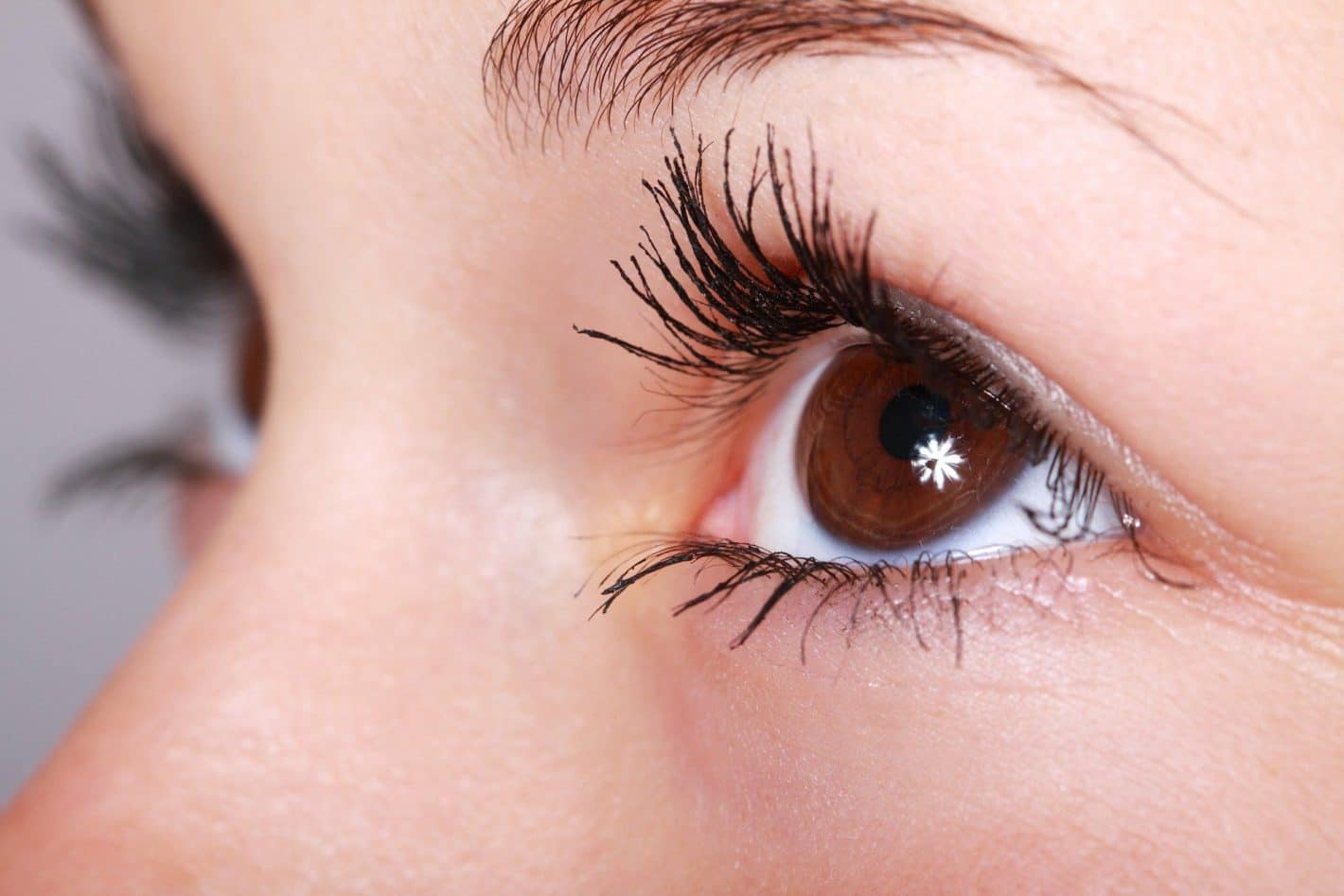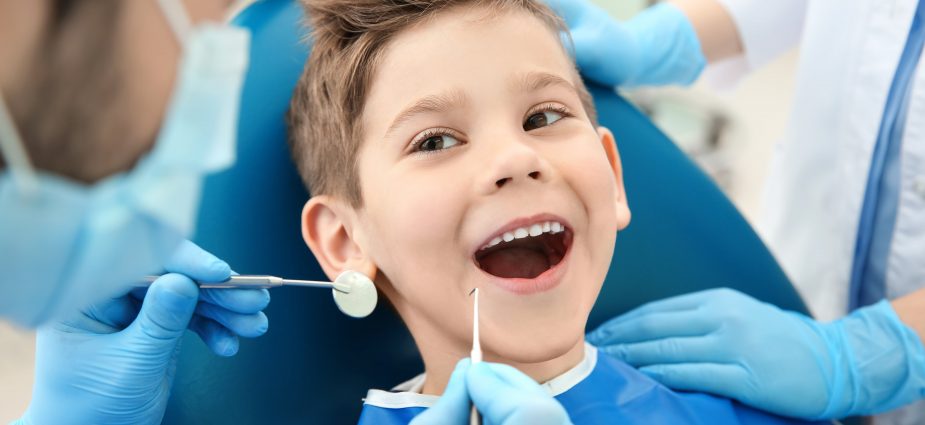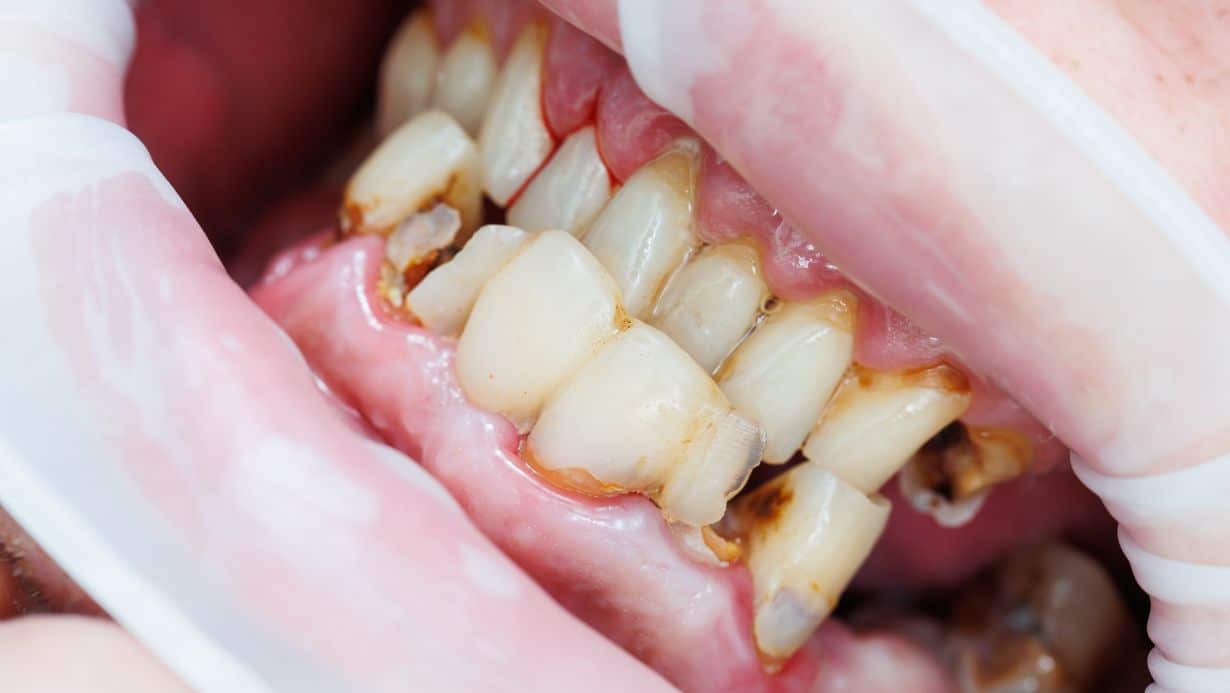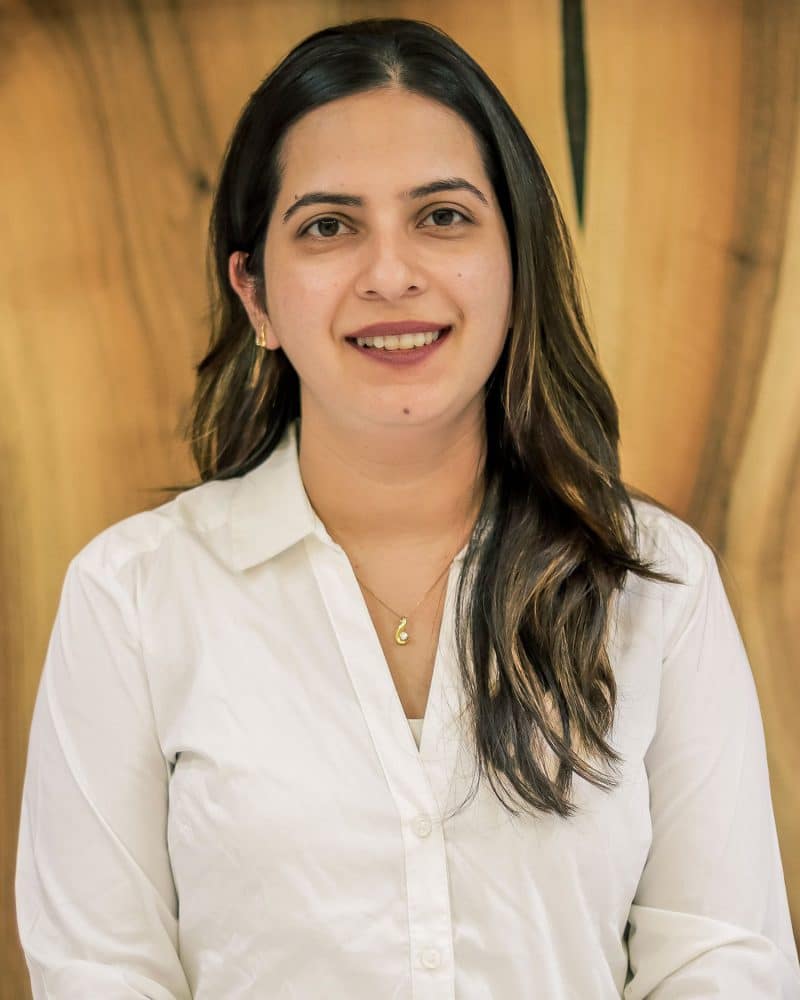“Tiny teeth trembling, dental caries looming near, Dr. Pratibha’s got magic, banish all your fear!”
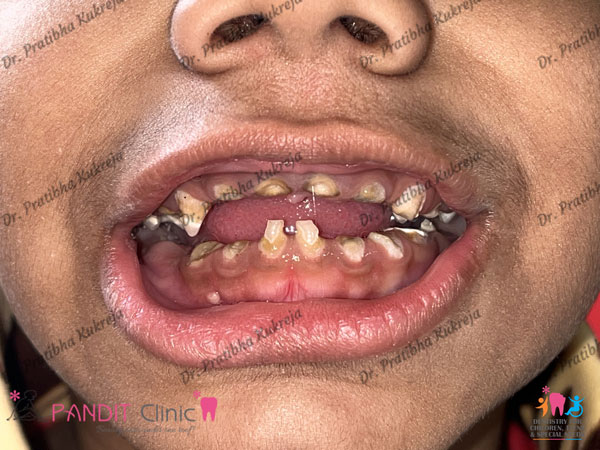
Imagine the joyous symphony of laughter echoing through a playground. It’s a sweet melody that speaks of childhood innocence and carefree fun. But amidst the merriment, a silent threat may be lurking in the mouths of our little ones: Early Childhood Caries (ECC).
While it might not be as visible as a scraped knee or a runny nose, ECC can cast a long shadow on the future of those tiny teeth, and its impact goes far beyond just cavities. Through this blog, Dr Pratibha Pandit will guide you through the treatment options, preventive measures and causes for dental caries. In Marathi dental caries is also referred to as ‘दंत क्षय,दात खड्डे,साखरेची किड, and दात खराब होणे . By whatever name you call it, Dr. Pratibha has a solution for it.
ECC: More Than Just Cavities, a Domino Effect of Disruption
Think of Early Childhood Caries (ECC) as a mischievous gremlin with a penchant for sugary snacks. He thrives on a diet of sweetened juices, sticky candies, and gooey treats, using them to fuel his army of plaque bacteria. These mischievous critters love nothing more than building cosy little homes on vulnerable baby teeth, churning out acids that slowly eat away at the enamel, leading to cavities.
But the damage doesn’t stop there. Cavities are just the first domino to fall in a chain reaction of disruption. The pain and discomfort can make it difficult for children to eat properly, leading to nutritional deficiencies and hindering their overall development. It can disrupt their sleep, make socializing uncomfortable, and even impact their learning and school performance. Imagine trying to concentrate on a math problem with a throbbing toothache!
The emotional toll is equally concerning. Children with ECC often grapple with self-consciousness about their smiles, impacting their confidence and social interactions. This can snowball into feelings of anxiety and isolation, leaving them feeling excluded and alone.
Unravelling the Culprits: What Fuels the Dental Caries?
So, what fuels dental caries? Well, the sugary culprit is at the top of the list. Every sip of a soda or bite of a cookie provides ammunition for the plaque bacteria, making their erosion mission easier. Poor oral hygiene habits, like infrequent brushing and flossing, give the gremlin more free reign to wreak havoc.
Even seemingly innocent practices like pacifier use can become accomplices in this dental drama. Dipping pacifiers in sugary concoctions or coating them in honey provides a constant sugar buffet for the plaque bacteria, setting the stage for early decay. And let’s not forget the importance of access to dental care. Regular checkups and preventive measures are crucial for catching ECC early and stopping its progression before it wreaks lasting damage.
What Leads to Dental Caries?
- Sugary Treats: Juice, soda, candies, and cookies provide the gremlin’s ammunition.
- Poor Oral Hygiene: Skipping brushing or flossing gives the gremlin free reign to build plaque fortresses.
- Pacifier Misuse: Dipping pacifiers in sugary substances or prolonged use fuels dental caries.
- Lack of Dental Care: Regular checkups and preventive measures are crucial to catching ECC early.
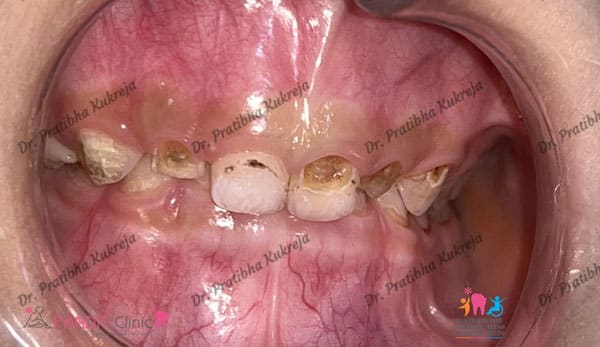
How Dr Pratibha, A Paediatric Dentist Help To Deal With Dental Caries?
The good news is, that we’re not powerless against early childhood caries. Armed with early detection and swift action, parents and dentists can become mighty superheroes in this battle for tiny teeth. Regular dental checkups starting at age 1, or within six months of the first tooth erupting, are the first line of defence. Dentists utilize their dental superpowers like thorough oral exams, X-rays, and sometimes even microbial testing to identify early childhood caries (ECC) before it takes hold.
The treatment toolbox? It’s brimming with options! Dental restorations can repair damaged teeth, fluoride applications strengthen enamel, and even dietary counselling can help families make healthier choices. In some cases, behavioural interventions may be needed to address habits that contribute to ECC, like frequent nighttime bottle feeding or thumb sucking.
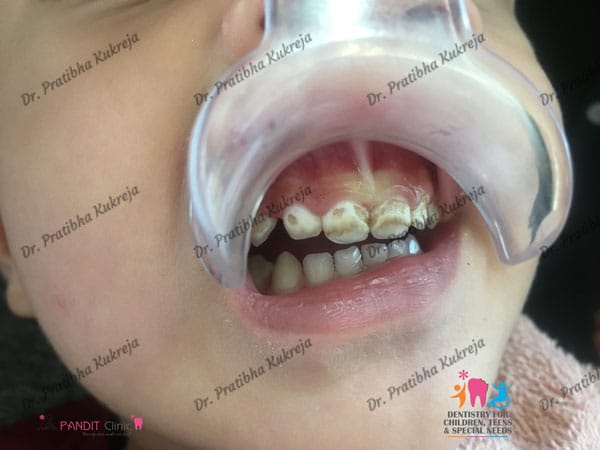
Empowering Parents: Tiny Habits, Mighty Impact
But the real superheroes in this story are the parents and caregivers. With the right knowledge and tools, they can become the gatekeepers of healthy smiles. Here are some powerful weapons in your arsenal:
- Limit the Sugary Treats: Opt for water, milk, and healthy snacks, making sugary drinks and foods occasional indulgences.
- Brush Away the Plaque Monsters: Establish a twice-daily brushing routine with fluoride toothpaste and don’t forget the daily flossing mission!
- Regular Dental Checkups: Early detection is key, so make those dentist appointments a priority.
- Pacifier Power Down: Avoid sugary dips and gradually wean pacifier use after age 1.
- Breastfeeding Buddies: If breastfeeding, ensure proper techniques to avoid contributing to ECC. Consult a lactation consultant if needed.
- Tiny Tooth Detectives: Be vigilant and monitor your child’s oral health for any signs of cavities or discomfort.
Beyond Cavities: The Long-Term Consequences of Early Childhood Caries (ECC)
The domino effect of ECC doesn’t just disrupt childhood. Untreated cavities can lead to misalignment and increased decay in permanent teeth, making them more susceptible to future problems. Research even suggests a possible link between ECC and systemic health issues like heart disease and diabetes, highlighting the importance of holistic dental care from a young age.
Does Early Childhood Caries Affect a Child Emotionally?
While the physical impact of Early Childhood Caries (ECC) is significant, the emotional ripples it creates deserve equal attention. Children with Early Childhood Caries (ECC) often face an invisible battle within themselves, struggling with feelings of self-consciousness and anxiety about their smiles. They may shy away from social interactions, fearing judgment and teasing. This can lead to isolation, and loneliness, and even impact their self-esteem, affecting their overall well-being.
Parents, too, grapple with the emotional fallout of ECC. They bear the brunt of worry and concern, often feeling helpless and overwhelmed. Juggling dental appointments, dietary changes, and managing their child’s discomfort can be emotionally draining. Acknowledging these challenges and offering support is crucial. This could involve connecting with other parents facing similar experiences, seeking professional guidance from a child therapist or counsellor, and reminding oneself that they are not alone in this journey.
The Superteam Assembled: Dr. Pratibha Pandit and the Path to Healthy Smiles
This is where the true heroes of this story step in pediatric dentists like Dr. Pratibha Pandit. Dr. Pandit and her team are dedicated to protecting tiny teeth and nurturing healthy smiles. They possess dental expertise and a deep understanding of the emotional complexities surrounding ECC. They offer a safe and welcoming environment where children feel comfortable and cared for, alleviating any anxieties they may harbour.
Through comprehensive treatment plans, tailored to each child’s individual needs, Dr. Pandit empowers parents to become active participants in their child’s oral health journey. She provides invaluable guidance on everything from oral hygiene practices to dietary modifications, fostering a sense of collaboration and shared responsibility.
From Tiny Teeth to Bright Futures: A Promise of Prevention and Care
By shining a light on ECC and its far-reaching impact, we can empower parents and caregivers to become proactive protectors of their children’s dental health. Early intervention, regular dental checkups, and healthy oral hygiene habits are the cornerstones of prevention. But let’s not forget the emotional dimension. Acknowledging the anxieties and challenges associated with ECC and offering empathy and support is equally important.
Additional Tips and Resources for Parents:
- Make brushing fun!: Turn toothbrush time into a bonding experience with fun songs, stories, or even reward charts.
- Embrace technology: Download educational apps or watch engaging videos about oral hygiene to keep kids interested.
- Involve the whole family: Lead by example and make healthy oral hygiene habits a priority for everyone.
- Seek professional help: Don’t hesitate to consult a pediatric dentist if you have any concerns about your child’s oral health.
- Remember, you’re not alone: Connect with other parents facing similar challenges through online communities or support groups.
Every tiny smile holds the promise of a bright future. With knowledge, proactive care, and the support of superheroes like Dr. Pratibha Pandit, we can ensure that children’s laughter continues to echo through the years, unburdened by the worries of ECC. Let’s work together to build a world where every child can flash a confident smile, free from the shadows of dental disease.
Virtual Video Consultations
100% SAFE AND SECURE CALLS WITH ENCRYPTION. YOUR PRIVACY AND CONFIDENTIALITY IS GUARANTEED.
Start here, by making an appointment for a virtual consultation with our expert Dr. Pratibha Kukreja Pandit (NEW PATIENTS ONLY).
Dr. Pratibha Kukreja Pandit is available for Virtual Video Consultations from Monday – Saturday between the hours of 11 am – 2pm and 4pm – 7pm.
If you are already our valued patient with questions or have an emergency please contact the clinic on +91 9822053446
Consult Dr. Pratibha Kukreja Pandit
(Pediatric Dentist)
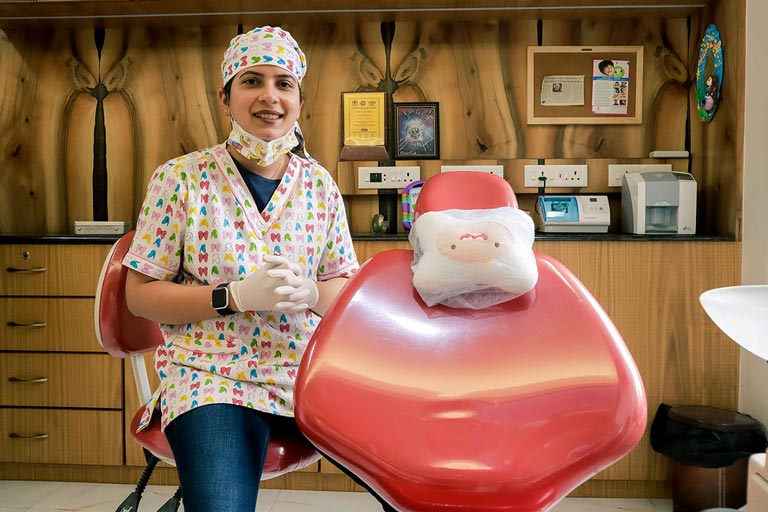
Virtual Video Consultation Fees Rs. 500
The Consultation Fees Must Be Paid Online by GOOGLE PAY BEFORE YOUR APPOINTMENT. See The Instructions On Appointment Confirmations
Your virtual video consultation includes:
- Discussion of problems that your child is facing like tooth pain, swelling or any other emergencies
- Dr. Pratibha will recommend a course of treatment or medications for your child.
Meet the Doctor
Pediatric and Preventive Dentistry Specialist
Dr. Pratibha is the Chief Dentist at Pandit Clinic. She is also a Consultant Pediatric Dentist at Kotbagi Hospital and KEM Hospital, Pune.
Dr. Pratibha has trained at the prestigious Chang Gung Memorial Hospital, Taiwan, in advanced areas including Pediatric dental treatment under General Anesthesia and Intravenous sedation, Dental Rehabilitation of children with special health care needs, and Nasoalveolar molding and dental rehabilitation of cleft lip and cleft palate.
She’s the lifetime member of Student Clinician Association, American Dental Association (SCADA), USA.
Professional Affiliations and Skills
- Trained in Pediatric dental treatment under General Anesthesia and Intravenous sedation at Chang Gung Memorial Hospital, Taiwan
- Trained in Dental Rehabilitation of children with special health care needs at CGMH, Taiwan
- Trained in Nasoalveolar molding and dental rehabilitation of Cleft lip and Cleft Palate at craniofacial centre, CGMH, Taiwan
- Awarded Lifetime membership, SCADA (Student Clinician Association, American Dental Association), USA.
You Might Be Interested In

Pune Women with PCOS: Say Goodbye to Unwanted Hair with Laser
Unwanted hair growth is a common concern for many women, and for those living with Polycystic Ovary Syndrome (PCOS), it can be a particularly frustrating

What To Consider For Laser Hair Reduction
Laser hair reduction has become a popular choice for those seeking a long-term and permanent hair removal solution for unwanted hair. As a dermatologist, I




